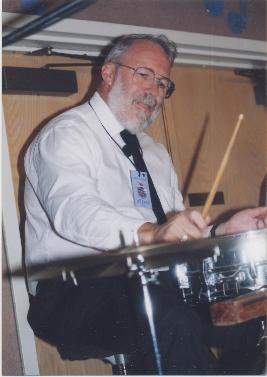CD Review
by Bert Thompson
BRIAN CARRICK’S ALGIERS STOMPERS—“SPIRITUALS AND OLD TIMEY
MUSIC”: A LIVE CONCERT OF NEW ORLEANS MUSIC AT ST. MARY’S
CHURCH, OTTERY ST. MARY, DEVON (P.E.K. Sound PKCD-332). Playing time:
71m. 53s.
Over the Waves;, He’ll Have to Go*; Smile, Darn Ya, Smile; Bring It on Home to Grandma*;
Have You Ever Been Lonely*; The Old Rugged Cross; I Wish I Could Shimmy Like My Sister
Kate‡; At Sundown; It’s All Over Now†; Is It True What They Say about Dixie*; God Will
Take Care of You; Kid Thomas Boogie Woogie.
Personnel: Peter Wright, trumpet; Brian Carrick, clarinet, tenor sax, vocal*; Chas,
Hudson, trombone, vocal†; Gabrielle Gad, piano, vocal‡; Malcolm Hurrell, banjo; Bill
Cole, double bass; John Baker, drums.
A new Carrick recording is always welcome. As soon as I could, I got this one into
the CD player; but I must admit to feeling a little let down by the end. That is not to
say it is a bad recording; rather, it just didn’t come up to the level I had anticipated.
Carrick’s playing is, as always, impeccable. There is no fault to find there. Cole’s
bowing the bass on a couple of the slower numbers—The Old Rugged Cross and God
Will Take Care of You—is a treat. Also the trombone’s deftly inserting quotations
from Lara’s Theme (Dr. Zhivago) and The Loveliest Night of the Year in the opening
number Over the Waves is tasty.
Similarly, the other musicians generally play their parts well. However, being a
drummer myself, I am always especially attentive to what is going on at the traps,
and for me there is just a bit too much going on there. The resulting “busyness”
seems to contribute on occasion to the uneven tempos on a few of the tunes.
Of course the drummer is not alone responsible for time keeping—the whole band
also needs to be part of the rhythm. But some of the other members also contribute to
the rushing that occurs from time to time, e.g. in Kid Thomas Boogie Woogie.
Finally, more ensemble playing and fewer solos—or at least fewer choruses in each
solo—would have made for more of the “New Orleans” feel that Carrick usually
strives for. Too often the ensemble-solos-ensemble pattern is present.
The tune list (with fewer spirituals than one might expect, given the disc’s title and
the concert’s location) is quite balanced between those that are very familiar and those
that are heard less often. For me the latter would include the country song He’ll Have
to Go, which I don’t recall having heard before, and Richard M. Jones’ composition
Bring It on Home to Grandma (in the same category as Li’l’ Liza Jane). I always enjoy
encountering tunes that I have not heard before or often, as I suspect many readers
do, too.
Nothing is said in the liner notes about the acoustics inside that apparently large
church, and they sound fine; but possibly they were not so for the musicians, which
might account for the intonation problems that surface occasionally. Sometimes an
instrument seems a bit out of tune. However, live recordings always involve some
slight risks, as this one illustrates, and all things considered I prefer them to studio
ones.
Although this CD came up just a bit short of my expectations, it does provide a
vicarious concert experience and some good listening. Ordering information can be
found at www.jazz-at-peksound.co.uk (P.E.K. website) and www.
heritagehallstompers.com (band website).
|
|


